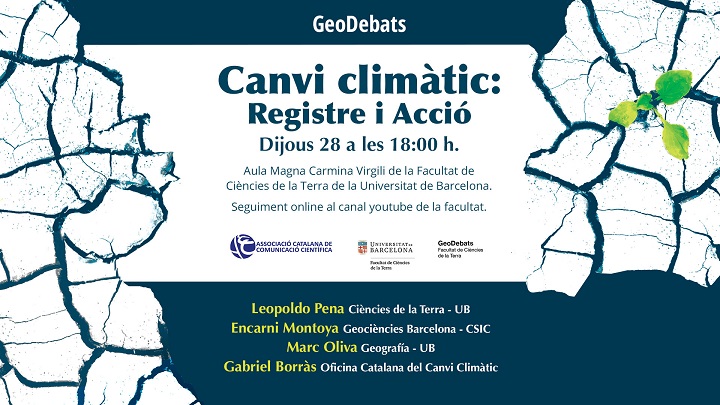GeoDebates: climate change, a global challenge

“We play Russian roulette with climate, hoping that the future will hold no unpleasant surprises. No one knows what lies in the active chamber of the gun”, stated climatologist Wallace S. Broecker in 1987. This is a well-known metaphor that warned about the effects of global warming. High temperatures, intense droughts and extreme precipitation are components of changes that were predicted decades ago; specifically, in 1992, with the first report on climate change by the Intergovernmental Panel on Climate Change (IPCC). But how big is this change compared to other periods in the past? How will it affect natural ecosystems and water resources? Will we be able to find snow in the Pyrenees in 2050? Are there enough policy and management tools to address one of the most challenging challenges facing the planet?

“We play Russian roulette with climate, hoping that the future will hold no unpleasant surprises. No one knows what lies in the active chamber of the gun”, stated climatologist Wallace S. Broecker in 1987. This is a well-known metaphor that warned about the effects of global warming. High temperatures, intense droughts and extreme precipitation are components of changes that were predicted decades ago; specifically, in 1992, with the first report on climate change by the Intergovernmental Panel on Climate Change (IPCC). But how big is this change compared to other periods in the past? How will it affect natural ecosystems and water resources? Will we be able to find snow in the Pyrenees in 2050? Are there enough policy and management tools to address one of the most challenging challenges facing the planet?
"Climate change: registration and action" is the title of the new edition of the GeoDebates, promoted by the Faculty of Earth Sciences of the University of Barcelona. The session, which has the support from the Catalan Association of Scientific Communication (ACCC), will take place on September 28 at 6.00 p.m., in the Aula Magna Carmina Virgilio at the Faculty of Earth Sciences of the UB. The debate, open to the public without prior registration, can also be followed live on the Youtube channel of this faculty.
In order to reflect on such a complex and highly topical subject, the following experts will participate in this session:
Leopoldo Pena, professor at the Department of Earth and Ocean Dynamics and member of the Consolidated Research Group in Marine Geosciences of the Faculty of Earth Sciences of the UB. He is an expert in the study of ocean and climate variability from marine records and in the development of techniques to reconstruct the physical and chemical characteristics of the seas in the past.
Encarni Montoya, researcher at the Geosciences Barcelona Institute (GEO3BCN) of the Spanish National Research Council (CSIC) and expert in palynology and paleoecology. Her research has focused on the study of the ecological responses of biota to climate change and natural hazards — especially in remote tropical regions — and on the study of the relationships between humans, climate and vegetation in the face of climate change.
Marc Oliva, professor at the Department of Geography of the Faculty of Geography and History of the UB and expert in the study of geomorphological processes and paleoenvironments in polar and mountain ecosystems through glacial and lacustrine records. He has conducted research campaigns in Antarctica and the Arctic, and in several high-mountain regions.
Gabriel Borràs, biologist and head of the Adaptation Area of the Catalan Office of Climate Change. He has worked in the management of water resources in Catalonia and currently focuses his activity on the deployment of the Catalan Strategy for Adaptation to Climate Change.
